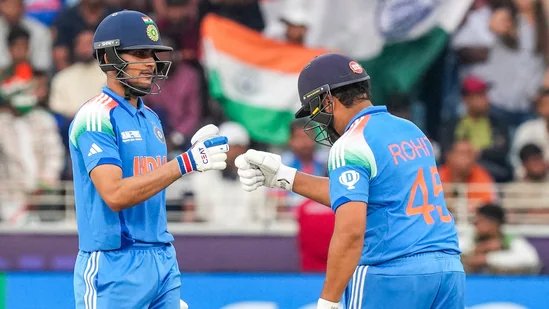Shubman Gill Takes the Helm: A New Era in Indian ODI Cricket
In a significant shift for Indian cricket, Shubman Gill has been appointed as the new captain of the One Day International (ODI) team, succeeding Rohit Sharma. This transition comes on the heels of India’s impressive performance in the 2023 World Cup and their subsequent victory in the 2025 Champions Trophy, marking a period of dominance in the 50-over format. Former cricketer Robin Uthappa has expressed his enthusiasm for this new chapter, highlighting the potential changes Gill may bring to the team’s approach.
A Legacy of Success Under Rohit Sharma
Rohit Sharma’s tenure as captain has been marked by remarkable achievements. Under his leadership, India played 56 ODIs, securing 42 victories, which translates to a win rate of 75%. This impressive statistic places him among the most successful captains in the history of international white-ball cricket. His strategic acumen and ability to inspire his teammates have been pivotal in establishing India as a formidable force on the global stage.
Despite this success, the Board of Control for Cricket in India (BCCI) has opted for a bold change, looking towards the future with the selection of Gill. This decision reflects a broader trend in sports where teams are increasingly prioritizing youth and potential over experience, aiming to build a squad that can sustain success in the long term.
Shubman Gill: A Rising Star
Shubman Gill, at just 25 years old, has already made a name for himself in international cricket. His recent performances in Test matches, particularly during the England tour, have showcased his potential as a leader. In his debut Test series as captain, Gill led a restructured Indian team-absent of stalwarts like Rohit Sharma, Virat Kohli, and R. Ashwin-to a hard-fought 2-2 draw against England. His personal contribution was nothing short of extraordinary; he amassed 754 runs, setting a new record for the highest runs by an Indian in a series against England, surpassing the legendary Graham Gooch.
Uthappa believes that Gill’s captaincy will not only allow him to establish his own style but also provide an opportunity for the team to evolve. “It will be interesting to see what kind of approach he takes to ODI cricket right now,” Uthappa remarked on his YouTube channel. “What brand of cricket do they want to play? I think there’ll be a slight adjustment there, especially with Rohit at the top with Shubman.”
The Dynamics of Leadership
The dual presence of Gill and Sharma at the top of the batting order presents a unique dynamic. While Sharma’s experience and tactical knowledge will undoubtedly benefit Gill, the young captain will need to carve out his own identity. This transition is reminiscent of past leadership changes in cricket, where new captains have had to balance the legacy of their predecessors with their own vision for the team.
Gill’s approach to captaincy will be closely scrutinized, especially in the upcoming series against Australia. Uthappa sees this as a critical moment for Gill to find his footing and establish his leadership style. “It also gives Shubman the chance to kind of get into that space and find himself as the captain of this format,” he noted.
Historical Context and Future Implications
The decision to appoint a young captain like Gill is not unprecedented in cricket history. Teams have often turned to younger players to lead, hoping to inject fresh energy and ideas into the squad. For instance, the Australian cricket team saw a similar shift when they appointed Ricky Ponting as captain at a young age, which ultimately led to a golden era for Australian cricket.
As Gill steps into this role, he will be tasked with not only maintaining the high standards set by Sharma but also innovating the team’s approach to the game. The evolution of ODI cricket has seen various styles emerge, from aggressive batting to strategic bowling, and Gill’s leadership will likely influence the direction India takes in this format.
Conclusion
Shubman Gill’s ascension to the captaincy of the Indian ODI team marks a pivotal moment in the nation’s cricketing history. With a legacy of success under Rohit Sharma and a promising future ahead, the upcoming series against Australia will serve as a litmus test for Gill’s leadership. As he embarks on this journey, cricket enthusiasts around the world will be watching closely to see how he shapes the team’s identity and strategy in the years to come. The blend of youth and experience at the top of the order could very well redefine India’s approach to ODI cricket, setting the stage for a new era of success.











